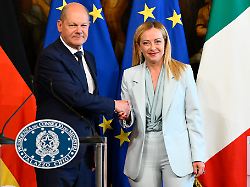From North Africa to Bavaria
Scholz and Meloni are planning a joint hydrogen pipeline
November 22, 2023, 10:08 a.m
Italy and Germany want to build a hydrogen pipeline from North Africa to Bavaria. Scholz and Meloni signed the plan on the sidelines of their meeting in Berlin. Migration issues, however, are treated less in the joint agreement with Africa.
The governments of Germany and Italy want to push ahead with the construction of a hydrogen pipeline from North Africa to southern Germany. This emerges from the “German-Italian Action Plan for Strategic Bilateral and EU Cooperation”.
Chancellor Olaf Scholz and Italian Prime Minister Giorgia Meloni want to sign it on the sidelines of the joint government consultations in Berlin. It emphasizes that the two large EU states want to promote the diversification of energy supplies and achieve the construction of new natural gas and hydrogen pipelines between Germany and Italy (via Austria and/or Switzerland).
This particularly affects the “South Central Hydrogen Corridor” (SCHC), which connects the southern parts of Germany and Italy with North Africa. The goal of the SCHC is to expand cross-border gas pipeline infrastructure and enable the import of ten million tons of hydrogen by 2030. “The corridor also offers enormous opportunities for the import of renewable energy from North Africa and connects demand centers in Italy, Germany, Austria and Switzerland, contributing to the emergence of a larger European hydrogen network,” the German-Italian statement said.
Energy, but no migration agreement with North Africa
To achieve this goal, Germany and Italy also want to promote the production of renewable energies, natural gas and hydrogen in North Africa. However, production must be in line with socio-economic and ecological standards. Scholz and Meloni had already discussed the project in June during the Chancellor’s visit to Rome.
In the 20-page declaration, the topic of migration is dealt with rather briefly. The existing six-monthly consultation mechanism is to be expanded. Closer coordination is also being sought within the framework of the new EU pact on migration and asylum “as well as in possible joint projects and EU cooperation with third countries of origin and transit”. Italy recently concluded an agreement with Albania to set up a refugee camp in which asylum procedures are to be carried out.
